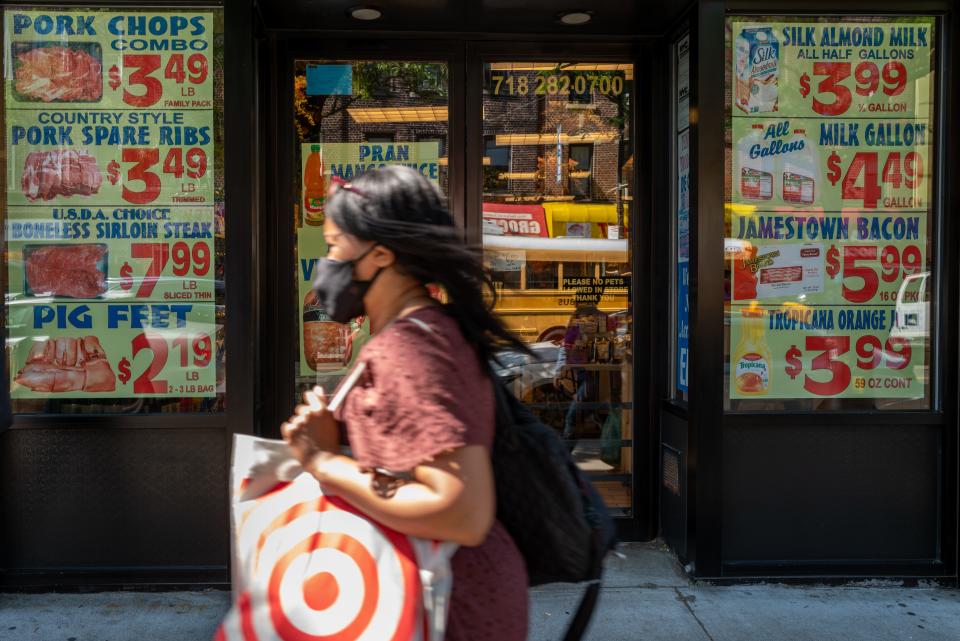'This isn't trivial': Applying for welfare benefits is too difficult, low-income Americans say
Low-income Americans are struggling to obtain help from state governments when they most need it, facing long delays and sometimes insurmountable hurdles when applying for social safety net programs such as food assistance, welfare benefits and health insurance, according to a new report.
The findings come as poverty rates, while nowhere near historic highs, have climbed in part because of the COVID-19 pandemic and ensuing financial crisis.
CONTEXT: Social safety nets such as the Supplemental Nutrition Assistance Program (SNAP) help keep tens of millions of people out of poverty each year, according to the U.S. Census Bureau. But people must provide many personal documents, complete lengthy, confusing applications correctly, prove they're eligible, and regularly update their information.
The report from the Urban Institute found most single adults earning up to $51,520 and most families with one child earning up to $87,840 applied for or received a social safety net program in 2021.
The report, which is based on a survey in December 2021, analyzed a nationally representative sample of more than 5,000 adults ages 18 to 64 making below four times the federal poverty level.
WHAT IS THE POVERTY LEVEL?: Decades-old US poverty level formula 'makes no sense' in 2022, experts say
Where do people experience the most problems?
Respondents said they had the most problems enrolling for unemployment insurance, SNAP and Temporary Assistance for Needy Families, known as TANF or more commonly as welfare benefits.
More than 40% of people who applied for or received one of the programs said they had trouble proving eligibility or getting benefits when they needed them.
“We’re not talking about four in 10 people reporting difficulty enrolling in their yoga class," said Marla McDaniel, a senior fellow at the Urban Institute and lead author of the report. "We’re talking about food for their families. This isn’t trivial, what people are seeking.”
WHY IT MATTERS: Social safety net programs are supposed to help eligible people, who often face great financial instability. But a high percentage of people who sought benefits told researchers they did not receive help as soon as they needed it.
The finding that more than 4 in 10 people who sought help meeting basic needs faced problems is "quite disconcerting," said Neeraj Kaushal, a professor of social policy at Columbia University in New York.
The report's other finding that 55% of surveyed adults sought benefits shows how much people are hurting, said Luke Shaefer, a leading expert on social safety nets and professor at the University of Michigan.
“The best indicator we have of whether or not families are struggling to make ends meet is when they seek out help," he said.
CASH SAFETY NET: You may qualify for unemployment even if you quit
Which programs help the most people?
SNAP and Medicaid/Children's Health Insurance Program (CHIP) are two of the largest government safety nets, according to the report.
Among adults surveyed, 39% applied for Medicaid/CHIP and 29% applied for SNAP in 2021.
Medicaid/CHIP was associated with lower levels of enrollment problems. That could be because the Affordable Care Act of 2010 and the Children’s Health Insurance Program Reauthorization Act of 2009 worked to "streamline" access and eliminate certain requirements, the report says.
'PUNITIVE POLICIES': More cities and states make homeless encampments a crime

Food stamp eligibility headaches are common
In the survey, respondents regularly expressed confusion about why they were denied SNAP dollars.
SNAP beneficiaries can also be afraid of making mistakes on their paperwork because providing false income information can result in staggering fines and lengthy jail sentences, according to the report.
"I won’t even apply for food stamps or Medicaid because I’m scared that they may say they overcharge me," said one survey respondent who had to pay back SNAP dollars after being overpaid. "'You have to pay this back or we’re going to lock you up for this.' That’s how I feel about them. It’s scary."

It's easy for recipients to "feel harassed" because they have to jump through so many hoops just to get money for basic needs, Kaushal said.
In a statement to USA TODAY, the Department of Agriculture said it "remains committed to looking for ways to remove barriers to access and make it easier for anyone who qualifies for federal food assistance to get the support they need, regardless of their background."
Latino applicants, people with disabilities report more problems
Families with annual incomes closer to or below the 2021 federal poverty line of $21,960 (for a family of three) were more likely to apply or participate in a social safety net program.
Latino adults were more likely than white and Black adults to report enrollment difficulties with Medicaid/CHIP and SNAP, probably because of language barriers and different eligibility rules for noncitizens, McDaniel said.
Adults with disabilities were also more likely than those without disabilities to report that Medicaid/CHIP program staff never or only sometimes treated them with courtesy or respect and to report not getting Medicaid/CHIP benefits as soon as needed.
This article originally appeared on USA TODAY: Welfare benefits too difficult to apply for, low-income Americans say

